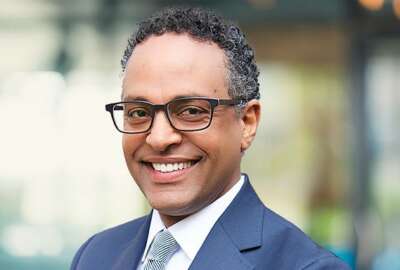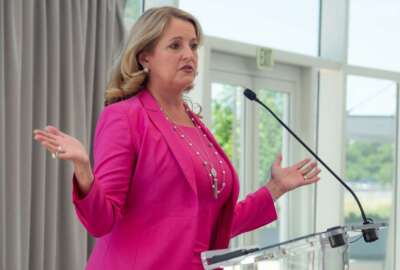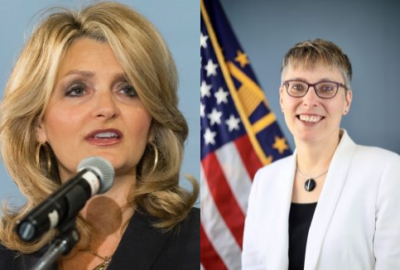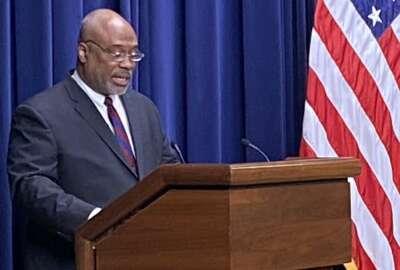Former OFPP administrators say new nominee must do these things to succeed
Biniam Gebre, who is nominated to be the next administrator of the Office of Federal Procurement Policy, would walk in without an obvious background in federal...
Biniam Gebre is an unknown commodity in the federal acquisition community. Basically when President Joe Biden picked the former appointee of the Department of Housing and Urban Development to lead the Office of Federal Procurement Policy, there was a collective “Who?” from current and former federal acquisition executives.
And on paper, Gebre has no discernable experience with federal acquisition beyond working for Accenture Federal Services. He majored in chemistry as an undergraduate and received his Master’s in finance and economics from Northwestern University’s Kellogg School of Management.
As I was contacted from these acquisition friends about the White House’s decision to nominate Gebre, it occurred to me that the similarities between him and former federal chief information officer Suzette Kent are striking. Like Gebre, Kent had no discernable experience to be the federal CIO. Her background, based on her LinkedIn profile and biography provided by the White House, offered no real evidence she was qualified to be federal CIO.
But what we couldn’t tell about Kent was her understanding of people and how to get them to work together toward common goals.
Kent, as it turned out, was one of the top federal CIOs in the last 20 years, proving, once again that old sports analogy, that paper and stat sheets mean nothing when the game is played on the field.
So to help Gebre understand the field, the conference and really the league he’s about to join — assuming the Senate confirms him — Federal News Network asked former OFPP administrators to offer some advice and insights to help Gebre prepare for the “game.”
Responses came from:
- Rob Burton, former OFPP deputy administrator and acting administrator from 2001-2008, and now a partner with Crowell & Moring’s government contracts group;
- Joe Jordan, former OFPP administrator from 2012-2014, now CEO of Actuparo LLC;
- Anne Rung, former OFPP administrator from 2014-2016, now senior vice president at Varis;
- Angela Styles, former OFPP administrator 2001-2003, now partner with Akin Gump Strauss Hauer and Feld; and
- Michael Wooten, former OFPP administrator 2019-2021, now vice president for National Industries for the Blind.
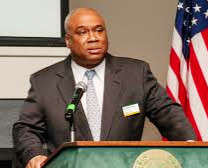
Federal News Network: Based on your experience, what were some of the areas that you saw as your biggest learning curves when you became OFPP administrator? How did you shorten the timeframe to learn what you needed to know?
Wooten: I came to the position without understanding how the budget side of the Office of Management and Budget worked, and I didn’t shorten that learning curve. There was the task of fixing the derailed implementation of Part B of Section 889, implementing sections of the CARES Act, all while we worked remotely. The next administrator should make it a priority to get to know the budget leaders, the principal associate directors (PADs) and deputy associate directors (DADs). Get the PADs and DADs to teach you about the budget process.
Jordan: The fastest way for an OFPP administrator to shorten the learning curve on almost anything is to seek the counsel of [current OFPP career staff] Lesley Field, Mathew Blum, Joanie Newhart, and the incredible career staff in the office. This is even, or maybe especially, true when dealing with the delicate balance of furthering the White House’s “social policy through procurement” priorities while also advancing the economy and efficiency of the federal procurement system. Almost every key stakeholder within the Executive Office of the President quickly learns about the president’s authority to issue executive orders that direct federal contractors to meet certain criteria, certify to various attributes, or exhibit a set of behaviors. While these can be very positive for the government and society, they also can come with significant costs to federal contractors, which can drive up prices for federal customers or harm the competitive dynamics of certain industries. Navigating these discussions without alienating any of the wonderful and committed colleagues, partners or stakeholders was the biggest challenge of the job.
Burton: I had an advantage when I moved to OFPP because of my 20 years of experience in DoD acquisition. Consequently, I was familiar with most of the laws and regulations governing federal procurement. However, I did not fully appreciate the influential role of OFPP. Someone told me to carefully read the OFPP Act before doing anything else. The OFPP Act is the law that established OFPP within the Office of Management and Budget in 1974. This was a great recommendation because I never appreciated how much authority the OFPP administrator has and the significant role OFPP plays in developing acquisition legislation, regulations and governmentwide procurement policies. Most importantly, the law allows the administrator to develop innovative solutions to address the many challenges facing the acquisition community.
Styles: Having been a government contracts lawyer for private industry before I started, I knew a lot of general information about the contracting process — what was working and what wasn’t working from the industry perspective. Still, I had to spend a good amount of time prioritizing administration initiatives, the needs of the government workforce generally and industry. The first month or two is a good time to soak in the issues and prioritize the focus of the office. Critical to that effort was relying on the OFPP staff to help with that effort. And it is also important to know when suggestions from staff or industry may need to be ignored.
Rung: I had to learn to navigate through the internal stakeholders, especially teams within the Executive Office of the President who may have interests and/or ownership of components of contract-related initiatives. I learned through trial-by-error as President Barack Obama issued contract-related executive orders and it required the participation of many internal teams to develop and execute on them.
FNN: What’s the best advice you received about being OFPP administrator from others in or out of government?
Burton: Several agency senior procurement executives and government contractors recommended that I routinely meet with industry associations and others to develop a better understanding of the practical problems both contractors and agency acquisition personnel face when implementing the regulations and policies developed by OFPP. As a result, I held quarterly meetings with various industry groups, which proved invaluable in addressing some of the serious problems confronting the federal acquisition system.

Rung: I received endless advice and guidance from the experienced, wise and incredibly kind and patient OFPP team, many of whom have worked under many presidents and administrators. I also learned from former administrators who graciously offered their time and advice whenever I needed it. Stan Soloway, the former president of the Professional Services Council and Defense acquisition executive, was also a great mentor and adviser. I do recall one great piece of advice from my legislative team before testifying: “Make them like you and forget you.”
Wooten: The best advice I received was to understand my reality — I was confirmed over halfway through President Donald Trump’s term — do not try to “boil the ocean” … play to your strength to achieve a reasonable win, such as creating a vision for the acquisition workforce. However, my best advice to anyone taking the administrator’s post: Know your authorities and understand them better than your colleagues in leadership.
Jordan: The best advice that I received was to always take a breath when the stress of the role was at its peak; remember that the president appointed you to this role for a reason, and you need to stay true to your convictions to do the job and serve the president well. The other great piece of advice about serving in this type of role came from my friend Dean Koppel, a longtime senior leader of the SBA contracting policy office. Before my first of more than a dozen Congressional hearings, he told me:
- You can never win a Congressional hearing — it is like arguing with your parents. So try to earn respect and then get out of there without anyone looking bad.
- If you don’t know the answer to a question, don’t guess!
Styles: Do what is right for the taxpayer. It is their money and they are relying on us to spend it wisely; [there are] few more important missions. The second one was “if all sides are a little unhappy you are probably on the right policy track. You never want anyone to be too happy.” And I will say that I received a lot of bad advice: “Be a cheerleader,” “follow in the footsteps of Steve and Dee,” [and] “don’t make Congress angry, particularly Republican members.”
FNN: What is the one or two things you wish you’d known about being OFPP administrator before you took the job?

Styles: How important all the career civil servants are to doing the job right. From OFPP to OMB to DoD, the job is impossible without them and without engaging them. Engage them early, get their ideas, seek their input on new policies.
Jordan: Well, I had already had a chance to work with the great OFPP and OMB team, so I had a pretty good idea about many of the role’s requirements. What I hadn’t fully grasped before arriving was how many different policy teams or offices look to federal procurement as the way to achieve their objectives. I wish I had been better prepared and more proactive in those conversations. For better or worse, there is infinitely more nuance to the job than simply trying to get federal agencies the highest quality goods and services for the lowest possible cost to the taxpayer.
Rung: I wish I had better understood the importance of developing internal relationships within the White House offices. I understood my role as head of the FAR Council and governmentwide acquisition councils, and my role as liaison with industry, but I didn’t understand the roles and responsibilities of other White House offices and how intertwined my role was with these teams.
Wooten: I wish I fully understood how to plan the “hand I was dealt.” What do you do when you have no procurement authority, a small but mighty staff with a far greater reach across government than I had, a big and powerful General Services Administration on the FAR Council, the Department of Defense juggernaut on the FAR Council, and a very slow FAR process? Answer: make friends in the West Wing. If confirmed, the 16th administrator will have time, and he will have the ability to build relationships that can help balance the political equation. Also make friends amongst OMB’s budget leadership, the “PADs and DADs.”
Burton: Since I was a federal career executive, I did not fully appreciate the role of politics in the development of procurement regulations and policies. Politics probably plays too much of a role in forming OFPP’s priorities and acquisition reform initiatives. In this regard, it is important for the OFPP administrator to rely on the outstanding career executives and professionals who work at OFPP. I found the staff to be invaluable in helping shape the president’s acquisition agenda and priorities for the benefit of the American taxpayers. Generally speaking, good procurement policy should be devoid of politics.
FNN: If you could put one item on his high priority to-do list, what should he tackle early on in his tenure?
Burton: I think it is critical for him to issue a policy memorandum that shows strong support for better communications between agency acquisition personnel and contractors. This should be a high priority for the Biden-Harris administration. Since I left OFPP and started working in the private sector, I have witnessed first-hand the serious problems that arise simply because of a lack of communication between the government and private sector contractors. Without question, robust communications and transparency will result in better market research, improved agency solicitations and statements of work and fewer bid protests and contract disputes. With very little effort, improved government-industry communications will result in significant cost savings and a more efficient acquisition system.
Rung: I will leave that important task to the next administrator, but the key is to clearly and often communicate that priority to galvanize the workforce and other key stakeholders (but understand that you will never achieve 100% alignment and consensus on any priority initiative). Don’t get bogged down with too many priorities — stay focused.
Wooten: There is a big win available in adjusting the system of e-commerce portals so that small business spend can be managed and accelerated in a way that is fair to small businesses. This approach can help him achieve the Biden administration’s goals of doubling the small business spend, and he can achieve this doubling without killing category management thereby driving up the cost of buying.
Jordan: I will let administrator-nominee Gebre decide that with the president and their great team. And I would only suggest that the ways to make those priorities come to fruition are communicating and working with all sides of the issues as much as possible. There are a lot of people out here rooting for him to be successful in this important role!
Styles: Establishing substantive credibility. It can be through speeches and meetings, but people need to know the person and their commitment to the job.
Copyright © 2025 Federal News Network. All rights reserved. This website is not intended for users located within the European Economic Area.
Jason Miller is executive editor of Federal News Network and directs news coverage on the people, policy and programs of the federal government.
Follow @jmillerWFED




